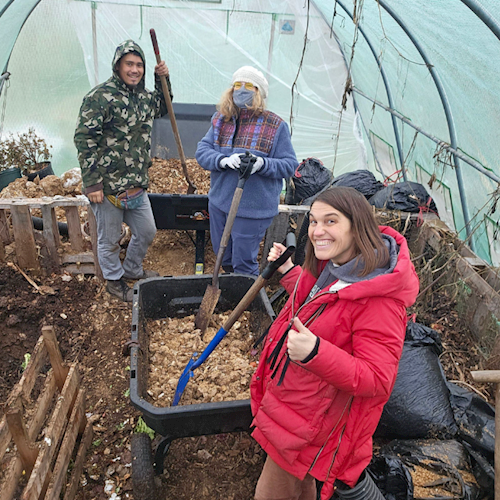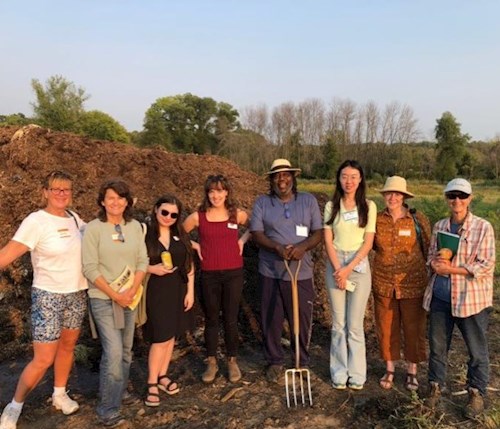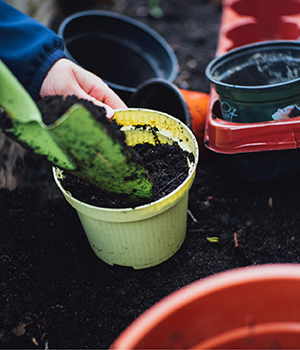
Under Wisconsin law, yard materials including leaves, grass clippings and small pieces of brush/branches are prohibited from disposal in landfills. Composting at home is a great way to manage your yard waste and household food items. There are many resources available to help you compost at home and the finished material is a great source of microorganisms and nutrients for your lawn and gardens.
For information on Dane County organics recycling programs, visit our Compost Services page.

Administered by the Dane County Department of Waste & Renewables, the Organics Management Grant is intended to help fund projects that reduce or eliminate the volume of organic materials, such as food scraps and yard waste, disposed of at the landfill. All Dane County businesses, institutions, municipalities, Native American tribal governments and organizations, community groups, and nonprofit organizations are eligible to apply.
Examples of projects and/or expenses that would be eligible for funds include, but are not limited to:
Subsidizing paid vendor services for the collection of food scraps for composting. To view information about the County's residential and commercial compost services, visit W+R's compost services page here.
The construction or purchase and set up of on-site systems for collection of edible food, food scraps, yard waste, and garden debris for recycling or reuse.
Consulting support or supplies for the development or expansion of a program to promote, educate, or otherwise enable efforts to reduce wasted food at its source, and/or provide reuse options.
Supplies or staff/ volunteer payroll for the development or expansion of a program to recover food for human consumption, or for recovery of food resources for use as animal feed.
The 2026 Organics Management Grant cycle is OPEN NOW! Applications for 2026 will be accepted until 11:59 PM 2/1/26.
Find the 2026 grant application form and instructions at the button below, a word document version can also be found here if you have issues with the below fillable pdf. All final pdf applications should be sent to waste.renewables@danecounty.gov by 2/1/26. For the 2026 grant cycle, a total of $10,000 is available in grant funding. Applicants may submit more than one proposal, but only one proposal per applicant will be funded.
Contact waste.renewables@danecounty.gov with any mini-grant related questions.
2026 Grant Timeline
1/1/26-2/1/26 Open application period
2/2/26-2/12/26 Application grading period
2/18/26 Awardees announced and contacted
3/1/26-12/15/26 Grant execution period
12/15/26 Final project reports due
The 2025 Organics Management Grant cycle is closed as of 11:59pm 4/4/25. Applications received after this time will be evaluated on a rolling basis if funds remain.
For the 2025 grant cycle, each applicant may receive up to $2,500, with a total of $10,000 is available in grant funding. Applicants may submit more than one proposal, but only one proposal per applicant will be funded.
See the application below for eligibility and submission details:

Find out more about our past awardees and their projects in the summary slides below:

Residents can make their own compost for garden and landscape projects by composting yard materials and certain food scraps at home. Composting is also a preferred alternative to burning yard materials, something which many Dane County communities do not allow without a permit.
When at home, compost can be made in bins or a heap. Bins are generally a better way to manage materials and can be either bought commercially or made. View the DNR's home composting brochure to get started or for tips on improving your current system.
Currently, the state of Wisconsin has no regulations on small-scale, home composting operations of fewer than 50 cubic yards, but please keep in mind that all composting should be done in a nuisance-free and environmentally-sound manner. This includes minimizing odors, not attracting excessive numbers of pests, and not placing compost piles in wetlands or other sensitive areas. Check with your municipality to find out if any local regulations apply.